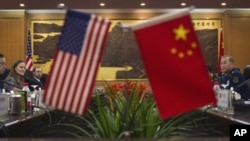American and Chinese defense officials met in Beijing Wednesday, amid tensions about Washington's recent announcement that it will base U.S. forces in Australia and continue to sell arms to Taiwan. Stephanie Ho reports from Beijing.
Ma Xiaotian, deputy chief of staff of the People's Liberation Army, and U.S. Undersecretary of Defense Michele Flournoy co-hosted the annual round of defense consultations in Beijing Wednesday.
The official Xinhua news agency quotes Ma as saying the fact that the one-day meeting took place as scheduled shows that both countries are sincere about maintaining military exchanges.
In September, the United States announced a nearly $6 billion arms sale to Taiwan, a separately-governed island China regards as a part of Chinese territory.
In response to past sales, an angry Beijing had suspended military exchanges with Washington.
James Nolt, the dean of New York Institute of Technology's Nanjing campus, says he thinks Washington has an interest in establishing more regular military channels of communication.
“I would say probably, for the U.S. military, the biggest issue with China is to try to have confidence building measures which are better ways to communicate, to make sure that there is not any kind of incident that would involve mistaken conflict or misunderstanding about a military exercise or missile launch or collision between warships at sea or things like that," said Nolt. "If they have agreements, that will make it less likely to have some kind of accidental conflict with China.”
He says another issue of concern is territorial disputes in the South China Sea. Beijing has pressed to resolve the issue with each of the other five claimants individually, but Nolt says, even then, there has been little progress.
“I think that causes worry in the United States because the United States feels that the chances of conflict increase as there is no visible process of negotiation," added Nolt. "And, I think the other countries are pushing China to negotiation and China seems not really willing to, because they [China] can assert their claim and start to defend it without having to negotiate and then daring the other parties to do something about it.”
In a speech to the Central Military Commission Tuesday, Chinese President Hu Jintao urged the navy to prepare for military combat.
Foreign Ministry spokesman Hong Lei Wednesday sought to reassure reporters who asked about President Hu's comments.
Hong repeated what has become the Beijing's consistent line - that China pursues a defense policy that is strictly defensive, does not pose a threat to other countries and is committed to peaceful development.
He added that China's development will bring important opportunities to the rest of the world.
The islands in the South China Sea are believed to lie above huge oil and gas reserves. In addition to China, the other claimants are Brunei, Malaysia, the Philippines, Taiwan and Vietnam.
US, China Hold Defense Talks




